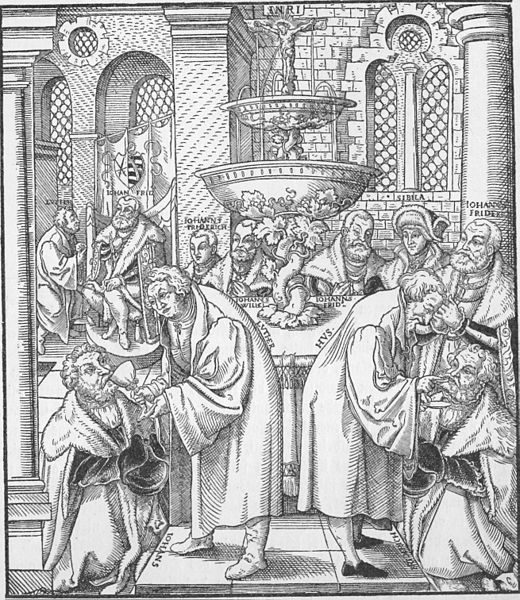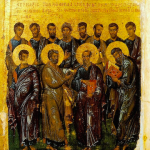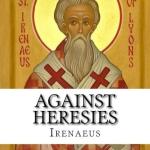
Allegoric representation of Sacramental union, the Lutheran doctrine of Real Presence of Christ in the Eucharist, after a woodcut by Lucas Cranach the Elder (1472-1553). In the front Communion under both kinds is pictured with (on the left) Martin Luther giving the chalice to John, Elector of Saxony. [public domain / Wikimedia Commons]
***
Catholics have this bad tendency to try to label other people. E.g., Catholics call the Lutheran view of the presence of Christ in the sacrament “consubstantiation,” but Lutherans just call it “real presence.”
This (humorously) illustrates the problem: the need for accurate description of various theological views. No one has any doubt as to where Catholics stand: transubstantiation means, literally, “change of substance.” No ambiguity, no confusion or unclearness. A person may disagree with that, but they know exactly what it is, by the term, and looking up what the term literally means.
Lutherans don’t like consubstantiation, but they haven’t offered us anything else besides “real presence” — a description that doesn’t convey in the slightest the distinctive Lutheran take on the Eucharist. Descriptive terms and labels are used precisely as “technical terms”: in order to avoid the need for a paragraph explanation of concepts, when a word can suffice (and a dictionary as well, if one wants to get the precise definition).
Seems I have touched a bit of a nerve with my remarks about the “Corpus Christi” festival, which I regard as Romanist bunk and tomfoolery,. . . (6-16-06)It is not we who call ourselves Lutherans. Rather, our adversaries call us that. We allow this to the extent that this title is an indication of the consensus that our churches have with the orthodox and catholic doctrine that Luther set forth from Holy Writ. Therefore we allow ourselves to be named after Luther, not as the inventor of a new faith but as the asserter of the old faith and the cleanser of the church from the stains of Papist dogmas. (10-31-10)
The second paragraph is quite remarkable, in that it uses papist: a term that any idiot knows is not what Catholics call themselves, while at the same time claiming that Lutherans have adopted their name because of the use of “adversaries.” But no one has forced them at gunpoint to use this name. It’s a voluntary matter. They chose it and use it. So they have no right now to protest that it derived from their “adversaries”.
I am unaware of a book called The Catechism of the Papist Church or a self-described category of “Romanist apologetics.” Plenty of our adversaries use those terms but it doesn’t follow that we do ourselves. Yet I am supposed to believe that Lutherans had no choice but to use a term they themselves object to? It’s beyond ludicrous and it strikes one as after-the-fact spin and rationalizing.
I should also note in passing that this notion that Luther “reformed” the Catholic Church and took it back to some supposed “old faith” (McCain’s words above) is factually untrue. It’s the fundamental “Protestant Myth.” The fact of the matter is that Luther was for the most part a revolutionary (one who overthrows and introduces brand-new elements), not a reformer (one who restores former things that have been lost or corrupted).
Lutherans (and other Protestants) know we don’t call ourselves by those terms (papist, Romanist) but no matter, they are used, anyway. And that is a question of preferred title (an ethical issue of rudimentary courtesy universally acknowledged), whereas the other involves complicated metaphysical-theological distinctions, and so, by virtue of that, is not nearly as straightforward or simple a matter compared to the alternate names Catholics are called.

















